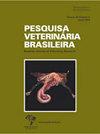Comparative analysis of PRNP 12-bp and 23-bp indels in healthy Aberdeen Angus, Aberdeen Angus x Hereford, Holstein Friesian and Uruguayan Creole cattle
IF 0.8
4区 农林科学
Q3 VETERINARY SCIENCES
引用次数: 0
Abstract
ABSTRACT: Bovine spongiform encephalopathy (BSE) is a transmissible progressive neurodegenerative disease characterized by the accumulation of a pathological isoform (PrpSC) of the cellular prion protein (PrpC) in the brain of cattle. Two insertion/deletion polymorphisms in the PRNP gene (23bp in the promoter and 12bp in intron 1) have been associated with resistance or susceptibility to the disease. The aim of this study was to analyze the distribution of these polymorphisms in 214 healthy bovines belonging to four different breed groups (Aberdeen Angus, Aberdeen Angus x Hereford, Holstein Friesian and Uruguayan Creole cattle). DNA samples were amplified by end-point PCR. A high frequency of the alleles and haplotype associated with susceptibility to BSE (del12 and del23, and del12-del23, respectively) were found in the Aberdeen Angus, Aberdeen Angus x Hereford and Holstein Friesian animals. At the same time, the Uruguayan Creole cattle presented a higher frequency of the alleles and haplotype associated with resistance to BSE (ins12 and ins23, and ins12-ins23, respectively). These data could indicate a greater genetic resistance of the Uruguayan Creole cattle to BSE compared to other analyzed breeds, reinforcing its value as a zoogenetic resource.健康阿伯丁·安格斯牛、阿伯丁·安格斯×赫里福德牛、荷斯坦弗里斯牛和乌拉圭克里奥尔牛的PRNP 12-bp和23-bp序列的比较分析
摘要:牛海绵状脑病(BSE)是一种传染性进行性神经退行性疾病,其特征是细胞朊蛋白(PrpC)的病理亚型(PrpSC)在牛脑中积累。PRNP基因的两个插入/缺失多态性(启动子23bp和内含子1 12bp)与该疾病的抗性或易感性相关。本研究的目的是分析这些多态性在属于四个不同品种群(阿伯丁安格斯牛、阿伯丁安格斯×赫里福德牛、荷尔斯坦弗里西亚牛和乌拉圭克里奥尔牛)的214头健康牛中的分布。采用终点PCR扩增DNA样本。在阿伯丁·安格斯、阿伯丁·安格斯×赫里福德和荷斯坦弗里西亚动物中发现了高频率的与疯牛病易感性相关的等位基因和单倍型(分别为del12和del23,以及del12-del23)。同时,与疯牛病抗性相关的等位基因和单倍型(ins12和ins23以及ins12-ins23)在乌拉圭克里奥尔牛中出现的频率更高。这些数据可能表明,与其他分析品种相比,乌拉圭克里奥尔牛对疯牛病的遗传抗性更强,从而增强了其作为动物遗传资源的价值。
本文章由计算机程序翻译,如有差异,请以英文原文为准。
求助全文
约1分钟内获得全文
求助全文
来源期刊

Pesquisa Veterinaria Brasileira
农林科学-兽医学
CiteScore
1.30
自引率
16.70%
发文量
41
审稿时长
9-18 weeks
期刊介绍:
Pesquisa Veterinária Brasileira - Brazilian Journal of Veterinary Research (http://www.pvb.com.br), edited by the Brazilian College of Animal Pathology in partnership with the Brazilian Agricultural Research Organization (Embrapa) and in collaboration with other veterinary scientific associations, publishes original papers on animal diseases and related subjects. Critical review articles should be written in support of original investigation. The editors assume that papers submitted are not being considered for publication in other journals and do not contain material which has already been published. Submitted papers are peer reviewed.
The abbreviated title of Pesquisa Veterinária Brasileira is Pesqui. Vet. Bras.
 求助内容:
求助内容: 应助结果提醒方式:
应助结果提醒方式:


